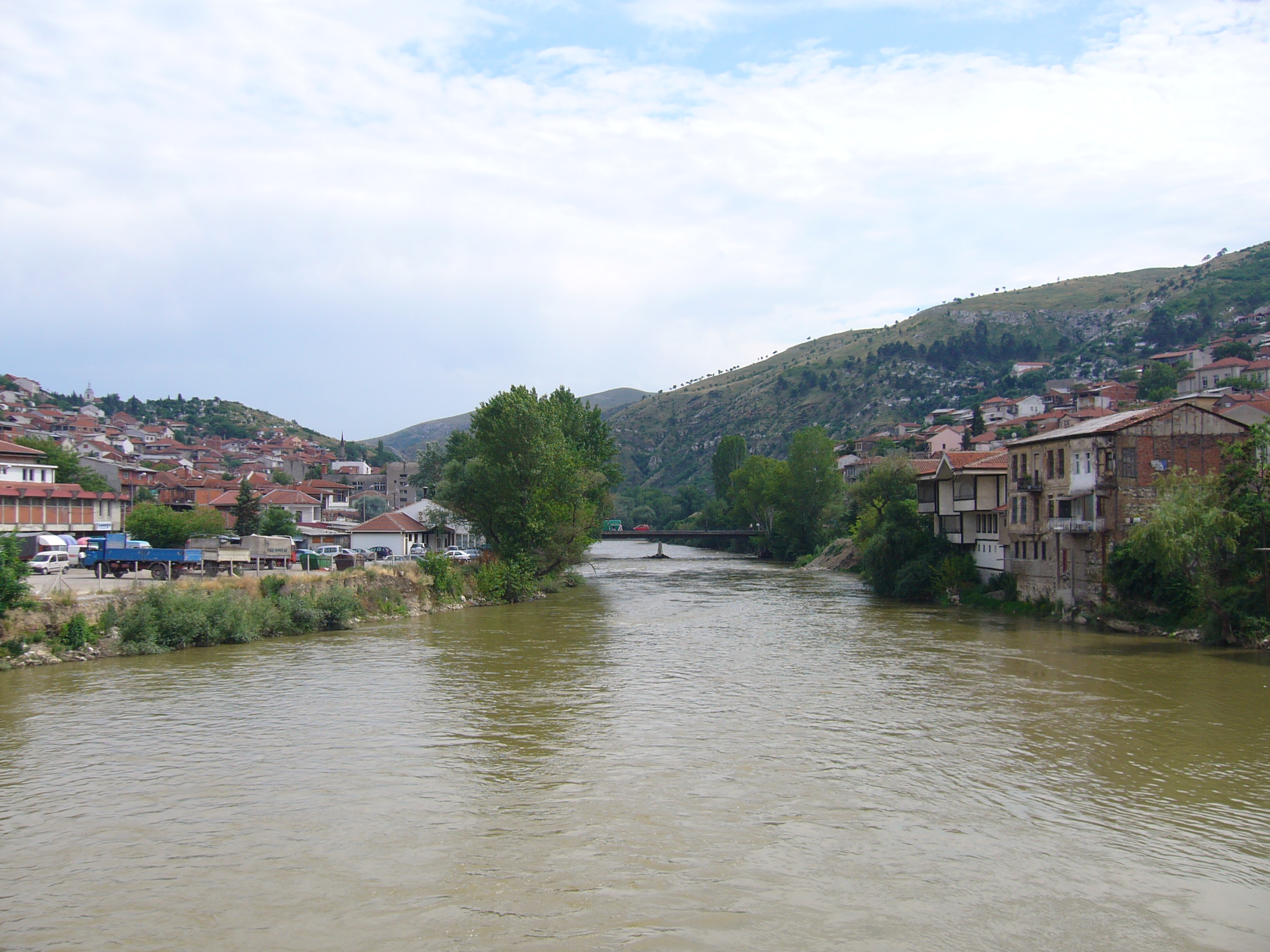- Vardar
Infobox_River | river_name = Vardar (Вардар), Axios (Αξιός)

caption = Vardar in Veles
origin =Vrutok , nearGostivar
mouth =Aegean Sea , nearThessaloniki
basin_countries =Republic of Macedonia ,Greece
length = 388 km
elevation =
discharge =
watershed =The Vardar or Axios ( _mk. audio|Mk-Vardar.ogg|Вардар; _gr. Αξιός, Axiós or Βαρδάρης, "Vardárīs";
Latin : "Axius") is the longest and majorriver in theRepublic of Macedonia and also a major river ofGreece . It is 388 kilometres long, and drains an area of around 25 000 km².The river rises at
Vrutok , a few kilometers north ofGostivar in the Republic of Macedonia. It passes throughGostivar ,Skopje and into Veles, crosses the Greek border nearGevgelija ,Rugunovec andAxioupoli ("town on the Axiós"), before emptying into theAegean Sea inCentral Macedonia west ofThessaloniki in northern Greece.The Vardar basin includes two-thirds of the territory of the Republic of Macedonia, which some have also called "
Vardar Macedonia " after the river.The valley comprises fertile lands in Polog, and Thessaloniki prefectures and Gevgelija and other parts. The river is surrounded by mountains elsewhere. The superhighways
Greece Interstate 1 in Greece and M1 and E75 run within the valley along the river's entire length to nearSkopje .Vardaris/Vardarec wind
The "Vardaris" or "Vardarec" is a powerful prevailing northerly
ravine wind which blows across the river valley in Greek Macedonia as well as in theRepublic of Macedonia . At first it descends along the "canal" of the Vardar valley, usually as a breeze. When it encounters the high mountains that separate Greece from the Republic of Macedonia, it descends the other side, gathering a tremendous momentum and bringing cold conditions to the city ofThessaloniki and the Axios delta. Somewhat similar to the mistral wind ofFrance , it occurs when atmospheric pressure over eastern Europe is higher than over theAegean Sea , as is often the case in winter.Etymology
*The most accepted theory on the origin of the name derives "Bardários" from the
Thracian language , fromPIE *"(s)wordo-wori-", "black water" [Orel, Vladimir. "A Handbook of Germanic Etymology". Leiden, Netherlands: Brill, 2003: 392.] (cf. German "schwarz" "black",Latin "suāsum" "dirt", Ossetian "xuaræn" "color", Persian "sioh" "black",Old Irish "sorb" "stain, dirt" [Mallory, J.P. and D.Q. Adams. "Encyclopedia of Indo-European Culture". London: Fitzroy and Dearborn, 1997: 147] ). This can be considered a translation or similar meaning of "Axios", itself Thracian for "not-shining" from PIE *"n.-sk(e)i" (cf. Avestan "axšaēna" "dark-colored") [ibid, p. 146] , and found in another name at the mouth of the Danube, "Axíopa" "dark water", renamed in Slavic "Crna voda" "black water" [Katičic', Radoslav. "Ancient Languages of the Balkans". Paris: Mouton, 1976: 149] . The name "Bardários" (Βαρδάριος) was sometimes used by theAncient Greeks in the 3rd CenturyBCE ; the same name was widely used duringByzantine era.* Its Greek name "Αξιός" ("Axios") is mentioned by
Homer (Il. 21.141, Il. 2.849 [ [http://www.perseus.tufts.edu/cgi-bin/ptext?doc=Perseus%3Atext%3A1999.04.0073%3Aentry%3D%231109 Axios, Georg Autenrieth, "A Homeric Dictionary", at Perseus] ] ) as the home of thePaeonians , allies ofTroy and it derives from the word "άξος" ("axos") meaning "timber", "forest-trees", because the river flow was used to transport timber [ [http://www.perseus.tufts.edu/cgi-bin/ptext?doc=Perseus%3Atext%3A1999.04.0057%3Aentry%3D%2311086 Axos, Henry George Liddell, Robert Scott, "A Greek-English Lexicon", at Perseus] ] .References
External links
* [http://homepage.mac.com/WebObjects/FileSharing.woa/63/wo/9BuHveinXUv7J5ce.1/2.2.1.2.26.31.97.0.35.0.1.1.1?user=sorin_paliga&fpath=ebooks:Linguists&templatefn=FileSharing2.html See Pre_Slavic_place_names.zip, page 33, for Vardar etymology]
* [http://www.danube-cooperation.org/library/93jovanovski.htm#1 Morava - Vardar (Axios) Navigation Route] , [http://www.pim.co.yu PIM "Ivan Milutinović", Belgrade, Serbia]ee also
*
Great Morava
*Pčinja River
Wikimedia Foundation. 2010.
